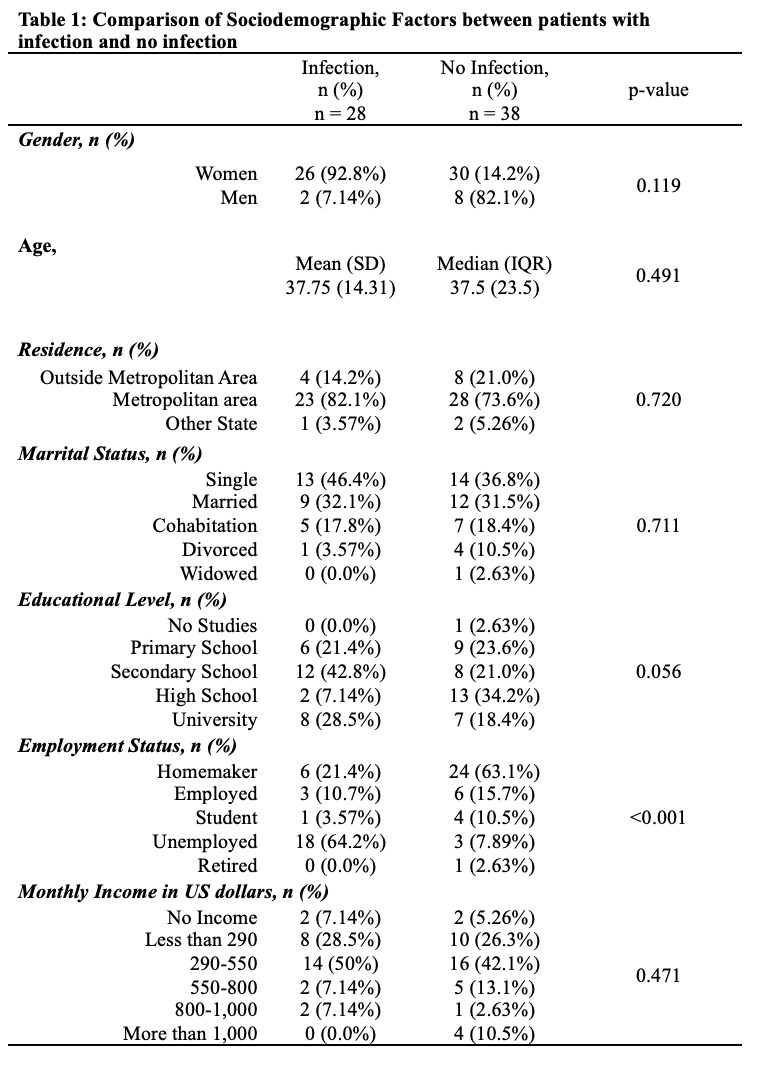Session Information
Session Type: Poster Session A
Session Time: 10:30AM-12:30PM
Background/Purpose: Socioeconomic status (SES) is associated with diseases and poor health outcomes, including delays in diagnosis and increased disease severity. Hospitalization, often due to infections, reflects disease severity and access to healthcare. SES exacerbates these challenges, increasing the risk of infection-related hospitalization. We aim to associate the impact of socioeconomic status on infection-related hospitalization in patients with systemic autoimmune disease.
Methods: We conducted a retrospective cohort study at a University Hospital from March 2023 to May 2024, we assessed the socioeconomic status (SES) of patients hospitalized with systemic autoimmune diseases. Data on hospitalization details, disease characteristics, and medications were collected from medical records. We compared infectious (cases) and non-infectious hospitalizations (control), examining SES factors such as income, and level of education. The Shapiro-Wilk test was used for the normality of quantitative variables, the Squared-Chi test to compare categoric variables, and the Mann-Whitney U to non-parametric continuous variables. A p-value < 0.05 was considered for statistically significant differences.
Results: A total of 249 patients were evaluated from clinical records. We excluded patients who did not have a diagnosis of systemic autoimmune diseases. Sixty-six patients with systemic autoimmune disease diagnoses were hospitalized at our University Hospital and referred to our rheumatology service. Of those patients, 28 (42.2%) were hospitalized for infectious reasons. Twenty-six (92.8%) were women and the mean age was 37 ± SD 14.31. Thirty-eight were controls without infectious causes of hospitalization and the median age was 37.5 ± IQR (23.5). The sociodemographic comparison between patients with and without infection is shown in Table 1.
Conclusion: There was a significant association between employment status and hospitalization for infection. Unemployed patients could have a higher risk of hospitalization for infection, perhaps for diagnosis and treatment delay. There is a trend toward below secondary school educational level for infection-related hospitalization.
To cite this abstract in AMA style:
Bardan-Inchaustegui A, Garza-Elizondo A, Gamez-Siller P, Esquivel-Valerio J, Cardenas-de la Garza J, Flores-Alvarado D, Salcedo-Soto D, Duran-Villarreal K, Osuna-Corrales A, Davila-Correa E, Cantu-Martinez V, Morales-Espronceda D, Gauna-Leal D, Prado-Prado A, Valdez-Benavides N, González-Ontiveros N, Galarza-Delgado D. Impact of Socioeconomic Status on Infection-Related Hospitalization Risk in Patients with Systemic Autoimmune Diseases [abstract]. Arthritis Rheumatol. 2024; 76 (suppl 9). https://acrabstracts.org/abstract/impact-of-socioeconomic-status-on-infection-related-hospitalization-risk-in-patients-with-systemic-autoimmune-diseases/. Accessed .« Back to ACR Convergence 2024
ACR Meeting Abstracts - https://acrabstracts.org/abstract/impact-of-socioeconomic-status-on-infection-related-hospitalization-risk-in-patients-with-systemic-autoimmune-diseases/

